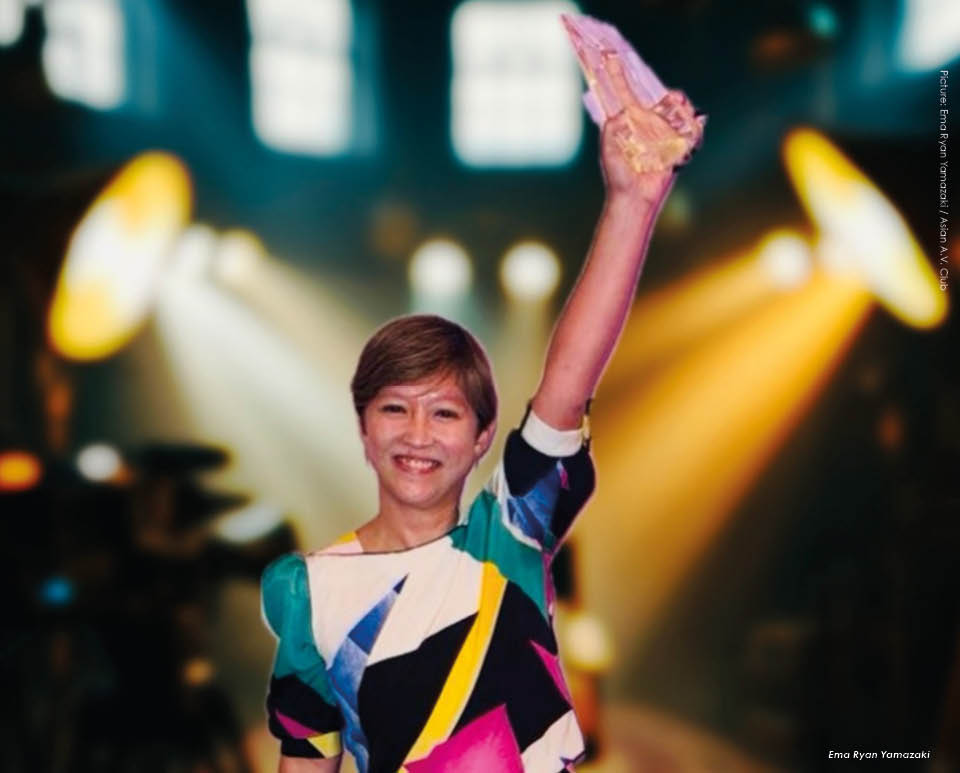
Oscar-nominated Japanese-British director Ema Ryan Yamazaki found her feet as a documentary feature filmmaker in the story of the couple who created kids’ character, "Curious George".
Living in New York at the time, she says she was “involved in amazing projects as an editor, and then after a few years, I thought, ‘This is great, but let me try directing’. Because what I couldn’t do as an editor was pick the subject, right?,” she tells the Asian A.V. Club.
In a wide-ranging interview, Yamazaki spoke about her start as a student filmmaker in Japan and, eventually in New York, her search for
“a story that would excite me, one that made sense for me to tell”.
A friend told her about husband-and-wife team, Margret and H.A. Rey, German Jews who fled the Nazis on bicycles, carrying the first "Curious George" manuscript. “I was like, ‘I gotta watch a movie about this. This sounds amazing’. And I realised there was no movie. It was such a dramatic story that I felt I could tell,” she says.
Yamazaki says "Curious George" was “one of the few childhood things I had in common with my American friends. In fact, I thought George was a Japanese character because all the books I read as a kid were in Japanese”.
“At first, I questioned my connection to the story since the authors were Jewish, and I’m not Jewish, so it wasn’t a direct identity link. But they had come to New York after fleeing the war and lived across the street from my dorm during my freshman year. Trying to accurately capture their lives became my obsession for the next few years. Since I didn’t have enough money to fund the project, I took on editing jobs to save up.”
Three years in the making, "Monkey Business: The Adventures of Curious George’s Creators" became her first feature. “I think it was my way of figuring out how to be a storyteller... That project defined that period for me, for sure. After that, I thought, ‘I’m hooked. I have to keep directing’. I also loved being in charge.”
Yamazaki also spoke to Asian A.V. Club about finding where her filmmaking heart really lay (not in narrative fiction), her decision to reconnect with Japan, and her path to her first big project, "Koshien: Japan�...
Oscar-nominated Japanese-British director Ema Ryan Yamazaki found her feet as a documentary feature filmmaker in the story of the couple who created kids’ character, "Curious George".
Living in New York at the time, she says she was “involved in amazing projects as an editor, and then after a few years, I thought, ‘This is great, but let me try directing’. Because what I couldn’t do as an editor was pick the subject, right?,” she tells the Asian A.V. Club.
In a wide-ranging interview, Yamazaki spoke about her start as a student filmmaker in Japan and, eventually in New York, her search for
“a story that would excite me, one that made sense for me to tell”.
A friend told her about husband-and-wife team, Margret and H.A. Rey, German Jews who fled the Nazis on bicycles, carrying the first "Curious George" manuscript. “I was like, ‘I gotta watch a movie about this. This sounds amazing’. And I realised there was no movie. It was such a dramatic story that I felt I could tell,” she says.
Yamazaki says "Curious George" was “one of the few childhood things I had in common with my American friends. In fact, I thought George was a Japanese character because all the books I read as a kid were in Japanese”.
“At first, I questioned my connection to the story since the authors were Jewish, and I’m not Jewish, so it wasn’t a direct identity link. But they had come to New York after fleeing the war and lived across the street from my dorm during my freshman year. Trying to accurately capture their lives became my obsession for the next few years. Since I didn’t have enough money to fund the project, I took on editing jobs to save up.”
Three years in the making, "Monkey Business: The Adventures of Curious George’s Creators" became her first feature. “I think it was my way of figuring out how to be a storyteller... That project defined that period for me, for sure. After that, I thought, ‘I’m hooked. I have to keep directing’. I also loved being in charge.”
Yamazaki also spoke to Asian A.V. Club about finding where her filmmaking heart really lay (not in narrative fiction), her decision to reconnect with Japan, and her path to her first big project, "Koshien: Japan’s Field of Dreams". This year, her short, "Instruments of a Beating Heart", was nominated for an Oscar, making her the first Japanese filmmaker to be nominated in the Best Documentary Short Film category. She also co-produced and edited Shiori Ito’s "Black Box Diaries", which made Ito the first Japanese to be nominated in the Best Documentary category.
“When I left Japan at 19 to attend NYU, I wasn’t sure I’d ever return – not in a dramatic way, as I’d still visit family, but in terms of my identity and career. Japan felt small and suffocating, especially as a mixed person constantly having to prove I was Japanese, yet never fully being seen that way. It became exhausting.
“Having access to the English-speaking world felt so much more exciting, and even eight years into living in New York while making Curious George, I rarely thought about Japan. I did go back a few times, wondering what it would be like to move to Tokyo, but it didn’t seem appealing. At the time, Japanese companies told me I’d have to start as an assistant for three years, fetching tea, even though I’d already been editing CNN shows for two years. It just didn’t make sense,” she says.
“Over time, though, my perspective shifted. While figuring out what to do after Curious George, it became clear to me that New York, while full of stories, was also saturated with storytellers.
“I kept asking myself, “Why me? What can I bring that’s unique?” Gradually, I realised the answer lay in Japan. I began to appreciate things I’d taken for granted growing up there – like trains running on time, people being considerate and clean streets. New York is great, but not for those things.
“Hearing non-Japanese people talk about their experiences in Japan also made me see it in a new light. I started to recognise how uniquely Japanese I was, even while living and working in New York. People would comment on how hardworking, responsible and team-oriented I was, and I realised these were qualities I’d inherited from my upbringing. I began to see them as strengths rather than sources of suffocation”.
Published in ContentAsia's 21 April 2025 eNewsletter
▶ ContentAsia is collaborating with the Asian A.V Club on a series of interviews with Asian filmmakers and talent. The full interviews of this edited excerpt is available on the Asian A.V. Club newsletter. Click here to read & subscribe!


















